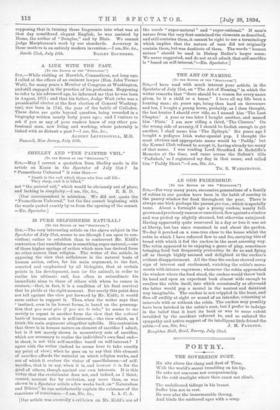IS PURE SELFISHNESS NATURAL ?
[To THE EDITOR OP THE 4' SPEOTATOA."] SIR,—The very interesting article on the alcove subject in the Spectator of July 21st, seems to me (though I am open to con- viction) rather to establish than to controvert Mr. Kidd's contention that unselfishness is something super-natural,—one of those higher springs of action which man has derived from no other source than religion. The writer of the article, in opposing the view that selfishness is the natural basis of human action, refers, for his main argument, to the fact, asserted and emphasised by all biologists, that at certain points in his development, man (or the animal), in order to realise his ultimate end, has often to subordinate his immediate aims to those of others with whom he comes in contact,—that, in fact, it is a condition of his final survival that he yields at the right moment. But surely this point does not tell against the view put forward by Mr. Kidd; it would seem rather to support it. Thus, when the writer says that instinct, even in its lowest forms, is based on the presump- tion that you must give if you are to take," he seems to me merely to repeat in another form the view that the natural basis of human action is self-interest,—the view which, as I think, his main argument altogether upholds. His contention that there is in human nature an element of sacrifice I admit, but is it not merely shown in momentary acts of sacrifice, which are necessary to realise the individual's own final end— in short, is not this self-sacrifice based on self-interest P I agree with the writer (indeed he seems here to take exactly my point of view), when he goes on to say that this element of sacrifice affords the material on which religion works, and out of which it evolves the virtue of unselfishness,—of self- sacrifice, that is to say, when it is, and because it is, for the good of others, though against our own interests, It is this virtue that the evolutionist does not, and indeed, as I think, cannot, account for by evolution, any more than, as was shown in a Spectator article a few weeks back, on " Naturalism and Ethics," he can satisfactorily explain the existence of the sanctions of conscience.—I am, Sir, &c., L. A. C. A.
[Oar article was avowedly a criticism on Mr. Kidd's use of the words " super-natural" and " super-rational," If man's nature from the very first contained the elements so described, and still contains them, it cannot be right to use a terminology which implies that the nature of man did not originally contain them, but was destitute of them. The words " human nature " should be used in Bishop Butler's larger sense, We never suggested, and do not at all admit, that self-sacrifice is " based on self-interest."—ED. Spectator.]


































 Previous page
Previous page